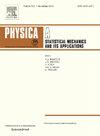基于自适应趋近律的智能网联排车跟随系统分布式滑模控制策略
IF 2.8
3区 物理与天体物理
Q2 PHYSICS, MULTIDISCIPLINARY
Physica A: Statistical Mechanics and its Applications
Pub Date : 2025-04-22
DOI:10.1016/j.physa.2025.130629
引用次数: 0
摘要
研究了基于汽车跟随系统的非线性滑模控制器。针对滑模控制中的抖振和有限时间收敛问题,提出了一种基于自适应理论的滑模控制方法。利用李雅普诺夫函数对控制器的性能进行了理论分析。分析表明,系统能在有限时间内收敛,提高了系统的动态性能和鲁棒性。为了验证控制器的有效性和实用性,本文首先在MATLAB中进行了数值仿真,然后用四辆无人车进行了实车验证。结果表明,本文提出的控制器能使系统在有限时间内收敛,大大减少了系统的抖振,缩短了收敛时间。该控制器保证了汽车跟随系统的稳定性,并具有较强的抗干扰能力。实验结果与理论分析相吻合。本文章由计算机程序翻译,如有差异,请以英文原文为准。
Distributed sliding mode control strategy based on adaptive reaching law for intelligent and connected vehicle platoon car-following system
This study investigates the nonlinear sliding mode controller based on car-following system. To address the issues of chattering and finite-time convergence in sliding mode control (SMC), an adaptive SMC based on adaptive theory is proposed. The performance of controller is theoretically analyzed using the Lyapunov function. The analysis indicates that the system can converge within a finite time, and both dynamic performance and robustness are improved. To verify the effectiveness and practicality of the controller, this paper first carried out numerical simulation in MATLAB, and then used four unmanned cars for real car verification. The results show that the controller proposed in this study enables the system to converge within a finite time, greatly reduce the chattering of the system, and reduce the convergence time. The controller ensures the stability of the car-following system, and provides strong resistance to disturbances. The experimental results are consistent with the theoretical analysis.
求助全文
通过发布文献求助,成功后即可免费获取论文全文。
去求助
来源期刊
CiteScore
7.20
自引率
9.10%
发文量
852
审稿时长
6.6 months
期刊介绍:
Physica A: Statistical Mechanics and its Applications
Recognized by the European Physical Society
Physica A publishes research in the field of statistical mechanics and its applications.
Statistical mechanics sets out to explain the behaviour of macroscopic systems by studying the statistical properties of their microscopic constituents.
Applications of the techniques of statistical mechanics are widespread, and include: applications to physical systems such as solids, liquids and gases; applications to chemical and biological systems (colloids, interfaces, complex fluids, polymers and biopolymers, cell physics); and other interdisciplinary applications to for instance biological, economical and sociological systems.

 求助内容:
求助内容: 应助结果提醒方式:
应助结果提醒方式:


